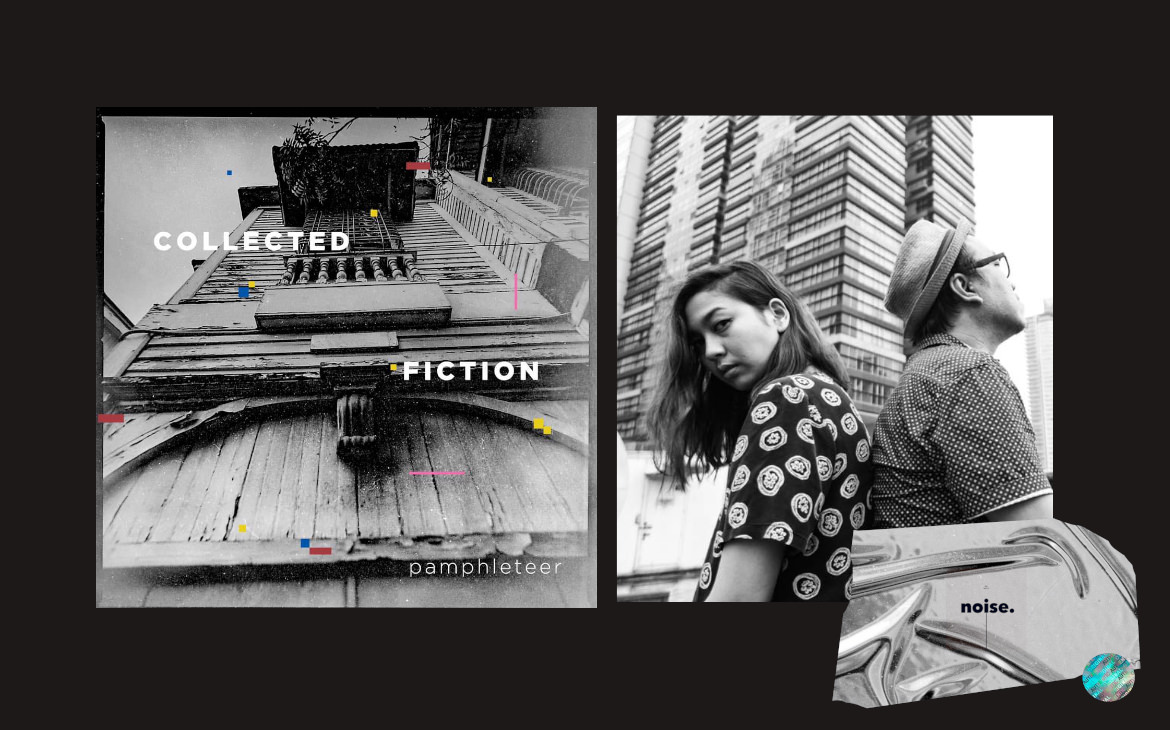By MC Galang and Ian Urrutia
Header Art by MC Galang
This week was tougher than usual. It seemed like our threshold for pain incrementally increased with each report of disgusting (and potentially illegal) behavior by people in power.
As always, we try to maintain some semblance of normalcy with keeping up with new releases from Asia via the weekly New Music We Love.
Last weekend, we were honored and happy to welcome Aldus Santos (Pamphleteer and The Purplechickens) to The Rest Is Noise as a regular contributing writer. Read his review of the newest Oh, Flamingo! release, Volumes, our first TRIN Recommends EP.
Elsewhere this week, Ian wrote about the comeback single of Skymarines, “Dear Moon,” and MC featured South Korean band Se So Neon on the Get To Know series.
Enjoy this week’s round of new music below.
MC’S PICKS
‘Phobic’ – Moonslug (PH)
“Phobic,” the second track to electronic producer Moonslug’s Simulacra EP is dejection in motion. Its anxiety makes itself known, shapeless yet gripping. It pulsates, yes, but only within a vacuum, trapped in its own dread. No one hears and no one else moves.
‘Seh Ah Seh’ – ?te (TW)
Taiwanese singer-songwriter ?te mulls over redundancy and disinterest, both in routines and relationships, on her latest lo-fi single, “Seh Ah Seh.” After all, her attempts at establishing meaningful connection have yielded disappointment in the past. But even at her most languid state, she can’t convince others—and herself—that all hope is abandoned. Not really.
‘Mainichi 毎日’ – Miyachi (JP)
The chorus to Japanese rapper Miyachi’s latest single is a dead-tone repetition of “毎日,” which translates to “every day.” Its graphic music video depicts Miyachi’s daily routine as a typical grunt, working with and for other corporate slaves in a fast-developing Japan, its economy—now the third-largest in the world—successfully rebuilt from the aftermath of World War II. While skill and technological development are critical to this economic growth, the Japanese workforce is also driven by one defining concept: loyalty (or at least an overt show of it), which was incentivized with lifelong job security, mainly.
Diligence and loyalty endured, with tremendous sacrifices. For many, it meant an uneven or loss of work-life balance and for others, being inflicted with serious ailments atypical of young people, such as stroke or heart failure. In extreme cases, death. Initially dubbed as “occupational sudden mortality,” it became a phenomenon so grim and pervasive in Japanese culture, it had its own word: karoshi 過労死.
In the end, Miyachi’s character slowly turned into a shadow of who he once was, deteriorating into a seemingly inevitable fate even before he made a deadly turn. “Mainichi” is a cautionary tale of success replete with irreversible consequences.
‘黄金屋’ – PO8 & Joy Ginger (CN)
Chinese rapper PO8 and Beijing-based electronic producer Joy Ginger teamed up on “黄金屋” (which translates to “golden house”), a slinky R&B house number reminiscent of And After That, We Didn’t Talk–era Goldlink. It’s one of those songs that finds its moment, however fleeting, doused with porous fun.
‘Nan Chun’ – Se So Neon (KR)
Spring is often tangled with rebirth, as the winter ground thaws and we see once again the first blush of life: trees greening and dotted with new blossoms. For some, it is a reminder of the impermanence of beauty, of life. With “Nan Chun,” South Korean indie rock band Se So Neon illuminates the sacredness of memory that endures, of love that survives. It is joy and warmth superimposed over sorrow; it is a promise of transformation; a memorial to loving harder, to living fuller.
IAN’S PICKS
‘Drunk and Bored’ – Pamphleteer (PH)
“Drunk and Bored” comes from a place of frustration: a banter distilled in silence and sensual longing, a showcase of resigned sadness in the unconscious meeting of minds. Like the songs in Pamphleteer’s debut album, Collected Fiction, it’s a conversation that doesn’t quite lead to a discussion. The two persons involved take turns with their internal monologue. Rather than depict a tryst that shows both of them holding a drink and locked in awkward glances, they’re completely facing each other in the opposite direction, separated by a wall.
This anthem of emotional defeat, which tackles the shattered remains of infidelity, could have been rewritten and structured as a cautionary tale just like any other piece of literary and musical work. But to our surprise and delight, Aldus Santos and Dee Cruz navigate this character study on “deeply flawed, terribly compromised” individuals with a somber perspective on how memory is a reliable source of storytelling rather than a gospel that preaches moral ascendency. As both grapple with the end of a “fictitious” secret relationship, they allow themselves to mourn even just for a good hour or two: Their presence blocked from each other’s cornered spaces, but their souls, yearning to meet—unrestricted and free from judgment.
This helplessness is heard in their voices, as their respective take conjures an internal push and pull dynamics that build into a beautiful meltdown. You can hear the rawness and immediacy of the exchange, resonating beyond words, revealing tension and ease to a clashing degree. Sure, it’s a great spectacle to witness, sort of watching a one-act play with a very receptive audience. And then it ends there abruptly, devoid of a happy ending and optimism, but its stinging effect stays like the stench of memories that you’ve been meaning to get rid of; leaving you scarred for a long time.
‘Unlover’ – The Wellington (ID)
Dreamy with a light coating of jangle pop, “Unlover” is the sound of pensively gazing out a car window, while you bask in the romantic ride for less than five minutes. Without running the risk of floating away, the song moves at a leisurely pace, its melodic resonance intact and covered in sugary noise. On this particular track, Indonesia’s The Wellington allows more room for sunshine, even as the guitars dose off to the lingering effects of haze and distortion. “I can understand you / and I wanna hold you,” Riftyza Gestandi sings, the lightweight elegance it illuminates shining brighter than ever, assuring the other person of his perpetual love and admiration.
Despite being certain of its last stop, nothing seems permanent on “Unlover.” The fuzz is bound to evolve into a fizz. The longing starts to fade. When the wistful tune reaches its final draw, you can hear Gestandi change his mind, hesitant but adamant about what to exactly say: “All the lies about you / I can’t stand any longer / so this must be over again.” Life has a way of teaching us a lesson: You may not always end up where you thought you were going, but for sure, you will end up where you are meant to be. And maybe for the better.
‘We Don’t Laugh’ – Susan (KR)
On “We Don’t Laugh,” Susan further dials down the sensual, downtempo pop of Everything But The Girl and Zero 7 in the best possible way, while retaining the intrinsic skepticism that informed her signature work. The Korean indie star lures you to her sonic breaking point, abandoning the acoustic styling that made her a fixture in a couple of streaming playlists to wholeheartedly embracing ambient pulse and sparse electronic instrumentation. The final product is as equally mesmerizing as her more accessible songs, and at its core is a rare mix of fragility and sweetness, which she turns into a source of strength.
‘Rumble Under My Toes’ – HubbaBabbas x Kwak Pureunhaneul – (SG/KR)
Singapore indie pop trio HubbaBabbas recently recruited Korean indie sensation Kwak Pureunhaneul on “Rumble Under My Toes,” a song that reflects one’s worries in decision-making, not knowing where to look for answers and when it’s time to finally come up with a verdict.
Stephanie of HubbaBabbas shares in a statement: “When we were facing uncertainty, we weren’t able to find much music to relate to because a lot of the music that we were listening to always had a clear feeling of the artist’s emotions – joy, sorrow… and for good reason. We felt this was a part of ourselves that was not so clear, and we wanted to encapsulate it in a song.” With tender arrangements and evocative subtleties, “Rumble Under My Toes” feels significantly small and intimate, but it concludes oddly enough as a big sigh, a forgiving relief you didn’t know you need after a tiring day.
‘Love’ – Cinéma Lumière (PH)
Peru’s Impermeable Records recently launched a compilation record that features saccharine indie pop tunes inspired by NME’s C86, except that instead of being released in cassette format, it’s made available as a free download on Bandcamp. Filipino alternative pop outfit, Cinéma Lumière joins the curated bunch with a new song called “Love”—a lovingly spare tune that is in retrospect, an earnest showcase of simplicity in terms of lyrics and melodies. Its key hallmarks—boy-girl harmonies, rainy-day guitars, and no-frills musicality—will surely make you feel warm and fuzzy on the inside. It’s a wistful walk to the shambles of twee.
‘Nego Down’ Ninaïs f/ Calix – (PH)
As a refreshing entry into the realm of indie/R&B crossover and divide, Ninaïs reveals a signature sound that sidesteps any attempt toward boilerplate sparkle. Her knack for less-is-more singing approach works more as an advantage rather than a liability. This is showcased on her new track “Nego Down” where her sense of restraint and flow shines through the minimal production.
Calix contributes a verse about a “man deserving of your touch,” and lets loose with a surprising outburst of charm and personality to give the song its much needed giddy headspace. Ninaïs, on the other hand, emits an alpha female stance: “Leave when you’re sober or drop by for an embrace / I wont even wanna change your mind / I wont even ask for time,” the newcomer sings, proudly wearing her beaming confidence for all the boys at the back to hear.






